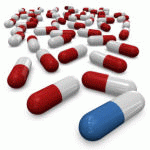Pharmacology
|
20 may 2022 16:00:44 |
| Pharmaceuticals, Vol. 15, Pages 631: Effect of Escitalopram on the Number of DCX-Positive Cells and NMUR2 Receptor Expression in the Rat Hippocampus under the Condition of NPSR Receptor Blockade (Pharmaceuticals) |
|
Tweet Background: Neuropeptide S (NPS) is a multifunctional regulatory factor that exhibits a potent anxiolytic activity in animal models. However, there are no reports dealing with the potential molecular interactions between the activity of selective serotonin reuptake inhibitors (SSRIs) and NPS signaling, especially in the context of adult neurogenesis and the expression of noncanonical stress-related neuropeptides such as neuromedin U (NMU). The present work therefore focused on immunoexpression of neuromedin U receptor 2 (NMUR2) and doublecortin (DCX) in the rat hippocampus after acute treatment with escitalopram and in combination with selective neuropeptide S receptor (NPSR) blockade. Methods: Studies were carried out on adult, male Sprague-Dawley rats that were divided into five groups: animals injected with saline (control) and experimental individuals treated with escitalopram (at single dose 10 mg/kg daily), escitalopram + SHA-68, a selective NPSR antagonist (at single dose 40 mg/kg), SHA-68 alone, and corresponding vehicle control. All animals were sacrificed under halothane anaesthesia. The whole hippocampi were quickly excised, fixed, and finally sliced for general qualitative immunohistochemical assessment of the NPSR and NMUR2 expression. The number of immature neurons was enumerated using immunofluorescent detection of doublecortin (DCX) expression within the subgranular zone (SGZ). Results: Acute escitalopram administration affects the number of DCX and NMUR2-expressing cells in the adult rat hippocampus. A decreased number of DCX-expressing neuroblasts after treatment with escitalopram was augmented by SHA-68 coadministration. Conclusions: Early pharmacological effects of escitalopram may be at least partly connected with local NPSR-related alterations of neuroblast maturation in the rat hippocampus. Escitalopram may affect neuropeptide and DCX-expression starting even from the first dose. Adult neurogenesis may be regulated via paracrine neuropeptide S and NMU-related signaling. |
| 167 viewsCategory: Medicine, Pharmacology |
 Pharmaceuticals, Vol. 15, Pages 632: Design and Synthesis of Novel Bis-Imidazolyl Phenyl Butadiyne Derivatives as HCV NS5A Inhibitors (Pharmaceuticals) Pharmaceuticals, Vol. 15, Pages 632: Design and Synthesis of Novel Bis-Imidazolyl Phenyl Butadiyne Derivatives as HCV NS5A Inhibitors (Pharmaceuticals)Pharmaceuticals, Vol. 15, Pages 633: Artonin F Induces the Ubiquitin-Proteasomal Degradation of c-Met and Decreases Akt-mTOR Signaling (Pharmaceuticals) 
|
| blog comments powered by Disqus |
MyJournals.org
The latest issues of all your favorite science journals on one page
The latest issues of all your favorite science journals on one page



